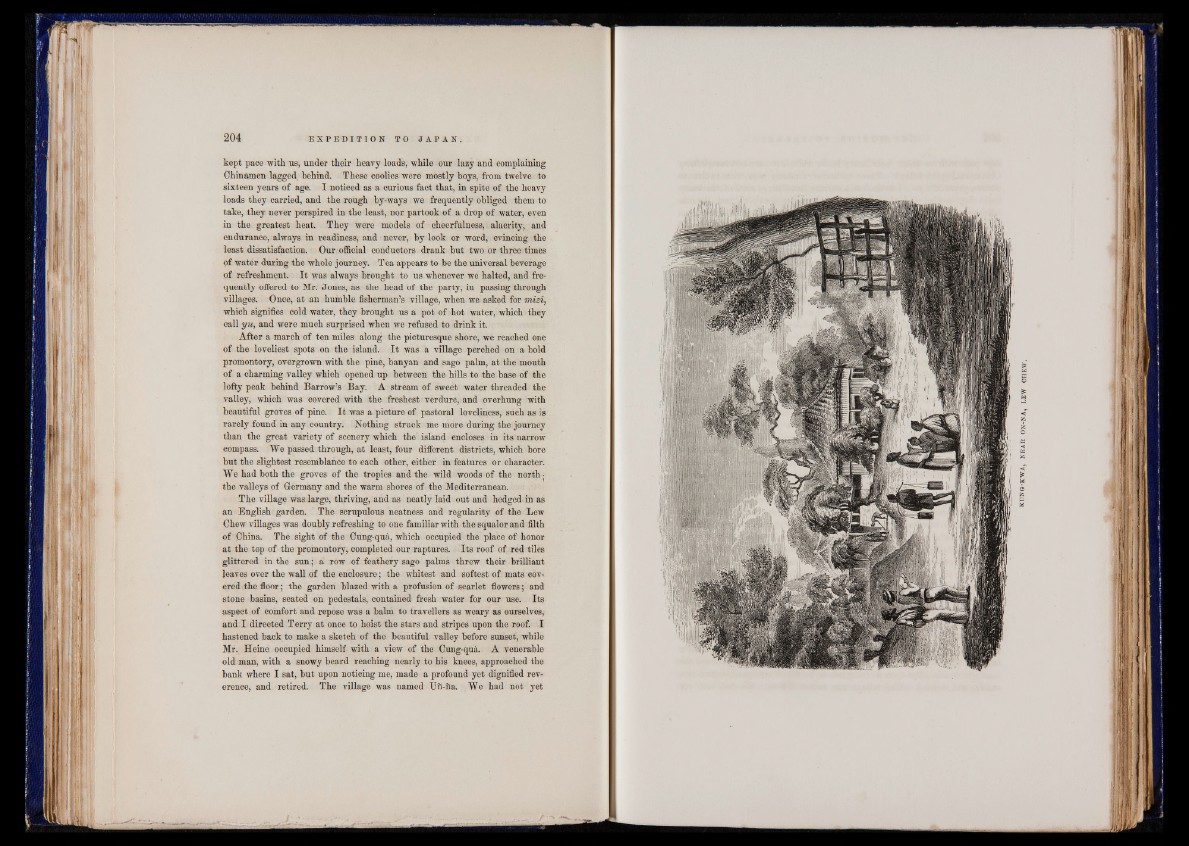
kept pace with us, under their heavy loads, while our lazy and complaining
Chinamen lagged, behind. These coolies were mostly hoys, from twelve to
sixteen years of age. I noticed as a curious fact that, in spite of the heavy
loads they carried, and the rough hy-ways we frequently obliged them to
take, they never perspired in the least, nor partook of a drop of water, even
in the greatest heat. They were models of cheerfulness, alacrity, and
endurance, always in readiness, and never, by look or word, evincing the
least dissatisfaction. Our official conductors drank hut two or three times
of water during the whole journey. Tea appears to he the universal beverage
of refreshment. I t was always brought to us whenever we halted, and frequently
offered to Mr. Jones, as the head of the party, in passing through
villages. Once, at an humble fisherman’s village, when we asked for mizi,
which signifies cold water, they brought us a pot of hot water, which they
call yu, and were much surprised when we refused to drink it.
After a march of ten miles along the picturesque shore, we reached one
of the loveliest spots on the island. I t was a village perched on a hold
promontory, overgrown with the pine, banyan and sago palm, at the mouth
of a charming valley which opened up between the hills to the base of the
lofty peak behind Barrow’s Bay. A stream of sweet water threaded the
valley, which was covered with the freshest verdure, and overhung with
beautiful groves of pine. I t was a picture of pastoral loveliness, such as is
rarely found in any country. Nothing struck me more during the journey
than the great variety of scenery which the island encloses in its narrow
compass. We passed through, at least, four different districts, which bore
but the slightest resemblance to each other, either in features or character.
We had both the groves of the tropics and the wild woods of the north-
the valleys of Germany and the warm shores of the Mediterranean.
The village was large, thriving, and as neatly laid out and hedged in as
an English garden. The scrupulous neatness and regularity of the Lew
Chew villages was doubly refreshing to one familiar with the squalor and filth
of China. The sight of the Cung-qua, which occupied the place of honor
at the top of the promontory, completed our raptures. Its roof of red tiles
glittered in the sun; a row of feathery sago palms threw their brilliant
leaves over the wall of the enclosure; the whitest and softest of mats covered
the floor; the garden blazed with a profusion of scarlet flowers; and
stone basins, seated on pedestals, contained fresh water for our use. Its
aspect of comfort and repose was a balm to travellers as weary as ourselves,
and I directed Terry at once to hoist the stars and stripes upon the roof. I
hastened back to make a sketch of the beautiful valley before sunset, while
Mr. Heine occupied himself with a view of the Cung-qu4. A venerable
old man, with a snowy beard reaching nearly to his knees, approached the
bank where I sat, but upon noticing me, made a profound yet dignified reverence,
and retired. The village was named Un-fia. We had not yet